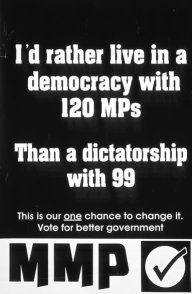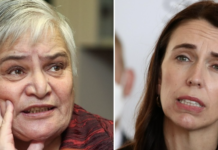MMP celebrated 25 years last week and it felt like no one knew what we were celebrating.
Hooton behind the Paywall at the Herald made some claim that rising house prices was proof positive MMP failed, I didn’t read his argument because the Herald Paywall is where opinion goes to die, but I’m guessing old Hoots was pretending the other liberalization global economic effects had nothing to do with rising property valuations and he’s trying to blame representative politics as the root fault.
Fuck off Hoots.
25 years ago the right and the wealthy fought the NZ people with scaremongering TV adverts threatening the end of Western Civilization as we knew it if we voted MMP.
What the right and the wealthy knew was that if elections became proportional and representative of the people voting, then National would lose the most because while Labour would win the popular vote, the electorate strongholds of the South always ensured National won.
There were several occasions where Labour won the greatest number of votes and yet still lost the election.
That’s why the forces opposing MMP reformed as ACT and started campaigning.
It’s always made me laugh that the very sane corporate filthy rich right wing brown shirt fascists who opposes MMP so vigorously immediately formed into ACT to try and benefit from the very electoral system they attacked.
MMP has allowed a softening of the tyranny of majority democracy but not enough to stop the neoliberal revolution of Douglas & Richardson.
We were promised a democracy but that’s only as good as the people voting. Sure we have a wider range of voices and faces but they are still majority property owners and rich pricks.
New Zealanders have yet to break with the sheep like quality of our tribalism and smaller parties are snuffed out because of the 5% threshold rule meaning only big monolith parties evolve enough to play.
I still think the vast majority of Kiwis don’t know how MMP works.
It hasn’t brought us the representative democracy we had hoped in terms of class but it has promoted more identities within our society.
We need more from the next 25 years!
Sent from my iPhone
Increasingly having independent opinion in a mainstream media environment which mostly echo one another has become more important than ever, so if you value having an independent voice – please donate here.
If you can’t contribute but want to help, please always feel free to share our blogs on social media






The problem I see with MMP is the Party Lists. The Lists give the parties power they didn’t have under FPTP, I.E. to ensure only party loyalists got into parliament. STV was my preferred choice, but none of the parties campaigned for that as it would have reduced their ability to control the make-up of parliament.
That could be solved by open lists, where voters get to rank the list or at least pick a list candidate alongside an electoral candidate. Bavaria has used such a system for its state elections, and it could potentially be adopted.
Interesting idea Aurelius, well worth considering; it would at least give the electorate some control over the list.
Yes, I went STV too, and certainly didn’t contemplate party lists enabling the inept politicians which they have.
What is democracy?
What does that look like today under the spectre of neoliberalism?
If anybody can answer that I would be appreciative.
Instead of any thoughts of tweaking MMP what we need is a major coalition party in power willing to make change. That’s why Labour were voted in. Labour don’t have a willingness for real change even with the biggest mandate you could ever want. Labour are National with red undies and the red undies have skid marks.
No we don’t live in a democracy. MMP is not really democratic because it does not address fundamental inequalities in society, and how the vast bulk of people have little or no say over the decisions that affect them. Often people get fooled by examining reforms to the form of parliamentary politics, rather than how society is organised in terms of stratified inequalities of power and wealth. We live in a plutocracy, not democracy.
The following quotes are about the US but the situation is much the same here, possibly more so given our small size and embedded neoliberalism.
‘The lower 70% on the wealth/income scale have no influence on [government] policy whatsoever. They’re effectively disenfranchised. As you move up the wealth/income ladder, you get a little bit more influence on policy. When you get to the top, which is maybe a tenth of one percent, people essentially get what they want, i.e. they determine the policy. So the proper term for that is not democracy; it’s plutocracy.’
– Noam Chomsky, ‘America behaves nothing like a democracy’, 2013
‘Under capitalism, we can’t have democracy by definition. Capitalism is a system in which the central institutions of society are in principle under autocratic control.’
– Noam Chomsky (2004). Language and Politics.
‘Actual policy outcomes strongly reflect the preferences of the most affluent but bear virtually no relationship to the preferences of poor or middle-class Americans.’
Martin Gilens and Benjamin Page, Affluence and Influence: Economic Inequality and Political Power in America, 2014
” So the proper term for that is not democracy; it’s plutocracy.’
– Noam Chomsky, ‘America behaves nothing like a democracy’, 2013
‘Under capitalism, we can’t have democracy by definition. Capitalism is a system in which the central institutions of society are in principle under autocratic control.’
– Noam Chomsky (2004). Language and Politics ”
YES and you will never read those statements or have it broadcast to the Hobbits in a way they can understand unless you offer a free combo meal.
FPTP sucks, unless you live with like minded people your vote counts for nothing. Which is what the rich and powerful want it.
The other argument is that it stops parliament from having a majority that can push through policies that people have voted for. I think Jacinda has proved that one wrong. 1: People aren’t given policies to vote for unless parties can help it; 2. It’s the ruling classes that prevent popular policies from getting pushed through.
I’d also note that under MMP the populace is free to vote for a single party with lots of power. If they don’t want it, should we really have an unpopular party with that power? Really dumb argument.
It would be good to pick MPs with the most votes instead of using party’s lists and we really need to get rid of the 5% rules which just leads to tactical voting.
All said and done – watch out. The government is reviewing the current system. Look out for attempts to chip away at our democracy (such that it is) in the ‘suggestions’ produced from this review.
I go through phases of being pro mmp and anti mmp.
Pros being the parties who get loads of votes actually enter parliament and vote splitting is less of a thing, that coalitions have stunted neoliberal reforms and parties like nzf who can work with the left or the right can nullify right wing agendas, and cobble a center left coalition like in 2017.
Cons are that this compromise means no reforms on the left either, 25 years of mmp and not much has changed or been done to overturn neoliberalism.
The major parties no longer have left wing or right wing activists fighting for change internally because all the purists fled to minor parties meaning the major parties have next to zero support in their ranks for the policies or reforms of the minor parties.
We also get mps who have no talent other than sucking up to the party to be placed high enough on the list and more and more professional politicians.
Mmp’s compromise means main parties look more and more identical in order to steal as many center votes as possible so there’s no centerist king maker.
The more the parties look the same the more they are the same the more voting changes nothing the more disappointed and less likely to vote some get….
And again mmp has proven toxic for reform agendas… But that would imply major parties had a reform agenda.
Nz doesn’t do proportional correctly either. It’s still very much a two party system with satellites. Four or five parties. We should have about 10 parties. There’s no genuine left wing or genuine right wing party and our parties are so immature during coalitions that our minor parties refuse to talk to the major party on the other side and our major parties would rather have fifteen elections in two years than even contemplate a grand coalition in the event a minor party is holding the nation to ransom I mean look at how Germany and Europe in general negotiate, nothing except extremest parties is off the table and they talk to each other like grown ups even if they disagree ideologically (which is weird cos in nz almost all our parties are more or less identically upper middle class liberal in a lot of ways)
All in all mmp is preferable to first passed the post, mmp is not perfect and we have a lot of lightweights have made bank out of being placed on parties lists, governments are ineffectual and unable to reform anything, there’s no political will to challenge neoliberal public servants because all or some of the parties in a coalition will be beholden or terrified of wellington.
That said we no longer have parties like social credit getting 10% or more with zero or two seats.
It also pisses off the main parties and there’s always a chance a radical minor party may force a major party to do a reform agenda
Comments are closed.